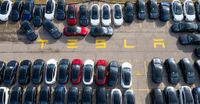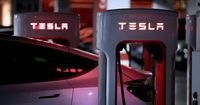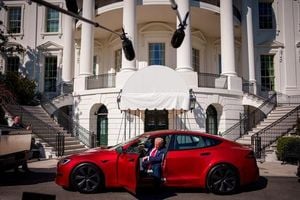Tesla is facing continued pressure both financially and culturally, and for many of its top competitors, its space in the car market looks unstable. Elon Musk's electric vehicle company has faced significant public backlash following the CEO's ever-tightening alliance with President Donald Trump. This response, combined with a declining stock price, has rivals making moves to capitalize on the weakened brand.
According to Newsweek, Tesla is Musk's most well-known brand and the biggest contributor to his net worth. Following Musk's appointment as head of the Department of Government Efficiency (DOGE) and subsequent role in the Trump administration's cuts to federal spending, protests against Tesla became synonymous with anti-Musk and anti-Trump sentiment, with demonstrators targeting Tesla dealerships worldwide.
As a result, Tesla's stock is feeling the strain, not helped by Trump's aggressive tariff policy, which clamps down on foreign exports that make up much of Tesla's supply chain. Tesla's share price dropped 4 percent over the weekend of March 29-30, 2025. The stock is down 41 percent since the start of 2025, 47 percent since Trump's inauguration, and 38 percent in the past month.
In 2024, Tesla shipped three of the top five most popular electric vehicles in the U.S., with the Model Y and Model 3 being the two most-bought EVs in the country last year. But now, other competitors that also ranked highly on the list are reporting high growth in 2025's first quarter, which indicates that Tesla's crown is slipping. "So far in 2025, according to January and February sales data, Hyundai electric vehicle sales have increased 10 percent, while hybrid sales have grown 65 percent," a spokesperson for Hyundai told Newsweek. "For EVs, the growth is being driven by IONIQ 5, which is up 36 percent. IONIQ 6 sales have increased by 13 percent."
The IONIQ 5, which already outsold the Tesla Cybertruck, was the fourth-best-selling electric car last year, making it one of the top alternatives to Tesla for shoppers on the market, according to data from Electrek. In other words, a reported spike in sales of Tesla alternatives coincided with Musk's increasing political action in the early months of 2025.
Similar moves are being made by Tesla's rivals in the international market. China's BYD Auto, the largest electric car manufacturer in the world, plans to double its sales outside China, focusing on markets where Tesla is facing backlash, including Europe and parts of Latin America. Chairman Wang Chuanfu said that BYD would target the United Kingdom, Southeast Asia, and Latin America in an expansion that takes advantage of sentiment in Europe, where protests against Tesla have also appeared, in response to both Musk and Vice President JD Vance attempting to influence politics there.
Rella Suskin, an equity analyst at financial firm Morningstar, told Newsweek that further competition is on the way in both the electric car and conventional car markets, with many companies eyeing the possibility of construction in the U.S. "Currently, the United States accounts for a mid-teens percentage of Volkswagen brand sales volumes," Suskin said. "The company's plans to expand significantly in the U.S. are evident through ongoing construction of a manufacturing facility for its U.S.-focused Scout brand, set to debut in 2027. Unlike Mercedes and BMW, Volkswagen sources most of its engines and transmissions domestically within North America."
Elon Musk told Sean Hannity earlier in March: "Tesla is a peaceful company; we've never done anything harmful, I've never done anything harmful; I've always done productive things. So there's some kind of mental illness thing going on because this doesn't make any sense." This statement comes as Tesla is expected to report its first-quarter delivery numbers on Wednesday, April 2, 2025. The statistics are likely to reveal the true impact of Musk's first few months of political power on the sales of his most important company.
In addition to financial woes, Tesla's sales in France and Sweden fell year-on-year for a third consecutive month in March 2025. This contributed to the lowest first-quarter sales figures in the two countries since 2021 for Elon Musk's electric car brand, as reported by Reuters. Tesla registered in March 3,157 car sales in France and 911 in Sweden, dropping respectively 36.83% and 63.9% from last year. Its quarterly sales were down to 6,693 in France and 1,929 in Sweden.
The group's market share in France dropped to 1.63% in the quarter ending March 2025, losing ground to brands not accounted for by the PFA, including BYD and other Chinese EV makers, whose total share of the market rose to 3.19%. Tesla currently faces a number of challenges in Europe. The EV maker has a smaller, aging lineup while traditional automaker rivals and new Chinese entrants are launching new, often cheaper electric models.
Musk's support of far-right parties in Europe, including for Germany's AfD that came second in February's national elections, also appears to have hurt Tesla's sales on the continent. "In the United States, the strategy would be to leverage, would be to tie to patriotism and shift to the right," said Eric Schiffer, chief executive of private equity firm the Patriarch Organization in Los Angeles. "The European strategy is going to be more challenged and will need to be more about the value and competitive differences with the market there," he added.
In response to Musk's right-wing activism, Tesla cars have become targets for vandalism across several countries, while "Tesla Takedown" protests are planned across Europe and the U.S. On Monday, March 31, 2025, Musk stated that an overnight fire at a Tesla dealership in Rome that destroyed 17 cars was an act of terrorism, reiterating earlier comments by Trump. The ongoing challenges could further complicate Tesla's position in the global market.
The upcoming delivery numbers are expected to provide crucial insights into how these cultural and financial pressures are influencing consumer behavior and Tesla's overall standing in the electric vehicle market.






